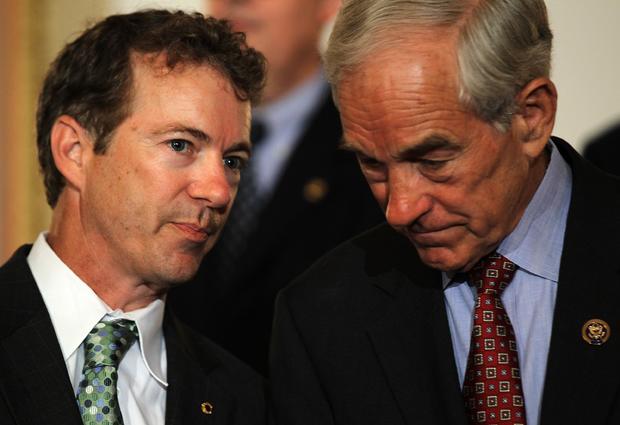Ron and Rand Paul say downgrade is fault of Washington, not Tea Party
Rep. Ron Paul, R-Tex., and his son, Sen. Rand Paul, R-Ky., both blasted Tea Party critics on Monday for suggesting that the conservative movement with which they're both linked may have had something to do with America's recent credit downgrade by the ratings agency Standard & Poor's.
The elder Paul, a longtime lawmaker, staunch libertarian, and presidential candidate, decried the allegations as an "attempt to scapegoat" Tea Party lawmakers. He pinned the downgrade on the Washington establishment.
"This attempt to scapegoat folks who recognize that our debt is out of control and that we must change course should not be tolerated," he said in a Monday statement. "They are simply demanding that Washington do its job."
Special section: America's debt battle
He continued: "We were downgraded because of years of reckless spending, not because concerned Americans demanded we get our finances in order. The Washington establishment has spent us into near default and now a downgrade, and here they are again trying to escape responsibility for their negligence in handling the economy."
In a Sunday appearance on CBS' "Face the Nation," Obama campaign adviser David Axelrod pinned responsibility for America's recent downgrade - from the top-rated AAA rating to AA+ -- on the Tea Party, arguing that the group's political "brinksmanship" during debt ceiling negotiations "brought us to the brink of a default."
"The fact of the matter is that this is essentially a Tea Party downgrade," Axelrod declared. "That clearly is on the backs of those who were willing to see the country default."
Former presidential candidate Howard Dean, also speaking on "Face the Nation," argued that the "radical right" had essentially scared mainstream Republicans off of voting for a debt limit package that could have included tax increases - and staved off the ratings dip.
"If you look at the Standard & Poor's report, three times they mentioned that our unwillingness to raise revenues was going to make it impossible for us to regain our credit rating," Dean said. "That's a pretty clear signal. The American people are there, the Democrats are there, a lot of reasonable Republicans are there, but they are terrified of these right wing splinter groups, the radical right, because they are so powerful in the primaries."
Rand Paul, the first-term Kentucky Senator who was elected in 2010 with the support of the Tea Party, argued that blaming the movement for America's economic woes was like "blaming the fireman for fires."
"Blaming the Tea Party for America's debt crisis and downgrade is like blaming the fireman for fires," he said in a statement. "The Tea Party has been fighting for a serious solution that would rescue our finances through immediate spending cuts, spending caps and most importantly, a Balanced Budget Amendment to the Constitution."
"While Democrats would like to lay blame on the Tea Party for the current economic failure, it is their President who has failed in leadership, failed to lower unemployment, failed to rescue our economy, failed to prevent a downgrade of our debt, and failed to control spending," he added.
The Dow Jones industrial fell 634.76 points on Monday, as anxiety plagued Wall Street on the first trading day since Standard & Poor's downgraded American debt. The drop is the sixth worst point decline for the Dow in the last 112 years. Every stock in the S&P's 500 index declined Monday.
From CBS Moneywatch.com:

